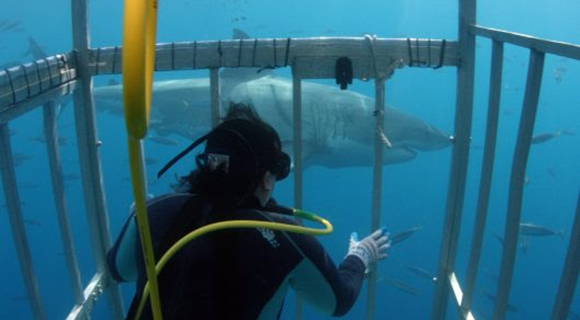Florida Tech Scientist Featured On Discovery’s Shark Week Program ‘Great White Shark Babies,’ Airs on Friday
By Florida Tech // July 24, 2018
‘Great White Shark Babies’ Airs Friday at 10 p.m. ET

BREVARD COUNTY • MELBOURNE, FLORIDA – Florida Institute of Technology evolutionary biologist Toby Daly-Engel is a featured scientist on Great White Shark Babies, a program airing at 10 p.m. EST Friday, July 27, as part of the 30th annual edition of Discovery Channel’s popular Shark Week.
The hourlong show is preceded by programs about “the spawn of Jaws” and the prehistoric Megalodon. Find the full schedule of Shark Week programming here.
The broadcast culminates a busy July for Daly-Engel, an assistant professor in Florida Tech’s Department of Ocean Engineering and Marine Sciences. Earlier in the month, she was part of a team of scientists who published a paper confirming the existence of a new species of dogfish shark, which they named for the pioneering female ichthyologist Eugenie Clark.
On Great White Shark Babies, Daly-Engel and scientists Mauricio Hoyos and Michelle Wcisel used DNA fingerprinting – the same CSI-type techniques humans use to solve crimes – to determine whether great white sharks in Vizcaino Bay in Baja, Mexico, were related as parent-offspring or siblings to the sharks in Guadalupe Island, about 240 miles west of the bay.
All aboard the S.S. Flavortown. Night 3 of #SharkWeek is ??? pic.twitter.com/cAOjG5t7Fj
— Shark Week (@SharkWeek) July 24, 2018
Linking the two populations would show that the nursery grounds in Vizcaino Bay are critical habitat for the Guadalupe white sharks, which would help make a case that the lagoon should be protected.

“From a scientific perspective, we really don’t know much about white sharks, even basic biological questions like where they go to feed and reproduce,” Daly-Engel said.
“The reproduction part is especially important because white sharks are threatened in a lot of places, and only by understanding where the baby sharks are living and where the moms are giving birth can we protect this part of the white shark life cycle.”
Daly-Engel grew up watching Shark Week. Filming the show – including seeing a white shark in person for the first time both on the water and in a cage below the surface – was nothing short of amazing, she said.
“The first time I saw a baby white shark, which was still almost 9 feet long, all I could think was how perfect it is. What a perfect predator,” she said. “Seeing the adults was just mind-blowing, although once I got in the water, it was all about the science.”
That meant using a specially tipped spear to collect a small skin sample to use for DNA testing, and generating data that will lead to better understanding of these iconic creatures.
Daly-Engel said she feels lucky to have been asked to participate in the show.
“Lucky to get to take part in an amazing adventure, work with incredibly talented colleagues and filmmakers, see some unbelievable animals, and do some cool science.”
CLICK HERE FOR BREVARD COUNTY NEWS














